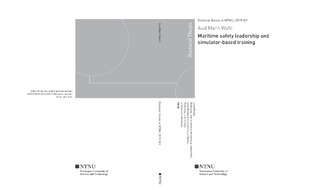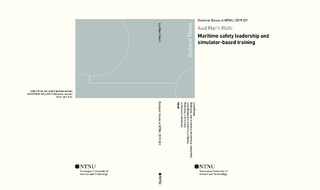| dc.contributor.advisor | Kongsvik, Trond | |
| dc.contributor.advisor | Dahler Hybertsen, Ingunn | |
| dc.contributor.advisor | Alstad, Torbjørn | |
| dc.contributor.author | Wahl, Aud Marit | |
| dc.date.accessioned | 2020-01-08T13:14:05Z | |
| dc.date.available | 2020-01-08T13:14:05Z | |
| dc.date.issued | 2019 | |
| dc.identifier.isbn | 978-82-326-4239-7 | |
| dc.identifier.issn | 1503-8181 | |
| dc.identifier.uri | http://hdl.handle.net/11250/2635365 | |
| dc.description.abstract | Ship officers hold a central role in maintaining safe and efficient operations at sea. The purpose of this thesis is to contribute to the understanding of maritime safety leadership and explore how bridge simulators can be used to train deck officers. This is investigated through a qualitative study answering four research questions:
1. How is safety leadership understood in a maritime context?
2. What leadership skills do maritime officers need, and how can these be trained?
3. What is the significance of social factors in the simulator-based training of professional deck officers?
4. How is the simulator-based training of deck officers used to manage performance variability and safety at sea?
The dissertation contains four different but interlinked scientific works addressing each specific research question in addition to contributing to an overall understanding of the social processes involved in maritime safety leadership and the training of deck officers. The empirical material is collected in two main bulks. The leadership context is investigated by spending 33 days at three oil tankers and by interviewing 50 crew members at these ships. Maritime training practices are investigated by observing 13 simulator-based courses for deck officers and by interviewing 12 instructors and 29 course participants.
The work uncovers that safety leadership in a maritime context can be described as a balancing act and demonstrates how maritime officers must adjust their leadership to both informal factors and formal requirements to run the ship in an efficient and safe manner. Six safety leadership skills are proposed – situation awareness, decision making, communication, team coordination, assertiveness, and adaptability. The last skill category relates to resilience skills and the ability to manage performance variability. The thesis coins the terms social fidelity to bridge the gap between computer technology and collaborative learning activities pointing to the importance of social processes in simulator-based training. The study demonstrates that realistic training should not only focus on adverse events and emergency handling but must also include mundane tasks and minor deviations so that operators can learn to catch and contain errors before they evolve into uncontrollable situations. | nb_NO |
| dc.description.abstract | Sammendrag
Skipsoffiserer har en sentral rolle i å ivareta sikre og effektive maritime operasjoner. Hensikten med denne avhandlingen er å bidra til forståelsen av maritim sikkerhetsledelse og utforske hvordan brosimulatorer kan brukes til å trene erfarne dekksoffiserer. Dette undersøkes gjennom en kvalitativ studie som besvarer fire forskningsspørsmål:
•Hvordan forstås sikkerhetsledelse i maritim sammenheng?
•Hvilke lederferdigheter trenger maritime offiserer, og hvordan kan disse trenes?
•Hvilken betydning har sosiale faktorer i simulatorbaserte opplæringen av profesjonelle dekksoffiserer?
•Hvordan brukes den simulatorbaserte opplæringen av dekksoffiserer for å håndtere variabilitet og sikkerhet til sjøs?
Forskningsspørsmålene belyses gjennom fire ulike vitenskapelige arbeider. Disse tar for seg ett forskningsspørsmål hver, men bidrar også til en helhetlig forståelse av sosiale prosesser relatert til maritim sikkerhetsledelse og trening av dekksoffiserer. Det empiriske materialet kan deles i to hoveddeler. Ledelseskonteksten belyses gjennom observasjonsdata fra 33 døgn ombord på tre ulike tankskip og intervju av til sammen 50 sjøfolk ombord disse skipene. Maritim treningspraksis belyses gjennom observasjonsdata fra 13 simulatorbaserte kurs for dekksoffiserer og intervju av 12 kursinstruktører og 29 kursdeltakere.
Avhandlingen viser at maritim sikkerhetsledelse kan forstås som en balansegang mellom uformelle faktorer og formelle krav hvor seks lederferdigheter er sentrale; situasjonsforståelse, beslutningstaking, kommunikasjon, teamkoordinering, trygghet i lederrollen og evnen til å tilpasse lederstil og ressursbruk til situasjonen. Studien introduserer begrepet ‘social fidelity’ for å beskrive viktigheten av sosiale prosesser i simulatorbasert opplæring. Arbeidet viser at god trening ikke bare fokusere på alvorlige feil eller krisehåndtering, men også omfatter dagligdagse oppgaver og mindre avvik slik at offiserene kan lære å oppdage og korrigere feil før de utvikler seg til kritiske eller uhåndterbare situasjoner. | |
| dc.language.iso | eng | nb_NO |
| dc.publisher | NTNU | nb_NO |
| dc.relation.ispartofseries | Doctoral theses at NTNU;2019:321 | |
| dc.relation.haspart | Paper 1: Kongsvik, Trond; Wahl, Aud Marit. Fra helt til mellomleder: Hverdagsledelse til sjøs. I: Sikkerhet og ledelse. Gyldendal Akademisk 2017 ISBN 9788205496774. s. 171-193 | nb_NO |
| dc.relation.haspart | Paper 2: Wahl, Aud Marit; Kongsvik, Trond. Crew resource management training in the maritime industry: a literature review. WMU Journal of Maritime Affairs (JoMA) 2018 ;Volum 17.(3) s. 377-396
https://doi.org/10.1007/s13437-018-0150-7 | nb_NO |
| dc.relation.haspart | Paper 3: Wahl, Aud Marit. Expanding the concept of simulator fidelity: the use of technology and collaborative activities in training maritime officers. Cognition, Technology & Work 2019 s. 1-14
https://doi.org/10.1007/s10111-019-00549-4 | nb_NO |
| dc.relation.haspart | Paper 4: Wahl, Aud Marit; Kongsvik, Trond; Antonsen, Stian. Balancing Safety I and Safety II: Learning to Manage Performance Variability at Sea Using Simulator-Based Training.
- Final published version in Reliability Engineering & System Safety 2019 ;Volum 195
https://doi.org/10.1016/j.ress.2019.106698 | nb_NO |
| dc.title | Maritime safety leadership and simulator-based training | nb_NO |
| dc.type | Doctoral thesis | nb_NO |
| dc.subject.nsi | VDP::Social science: 200::Economics: 210 | nb_NO |

